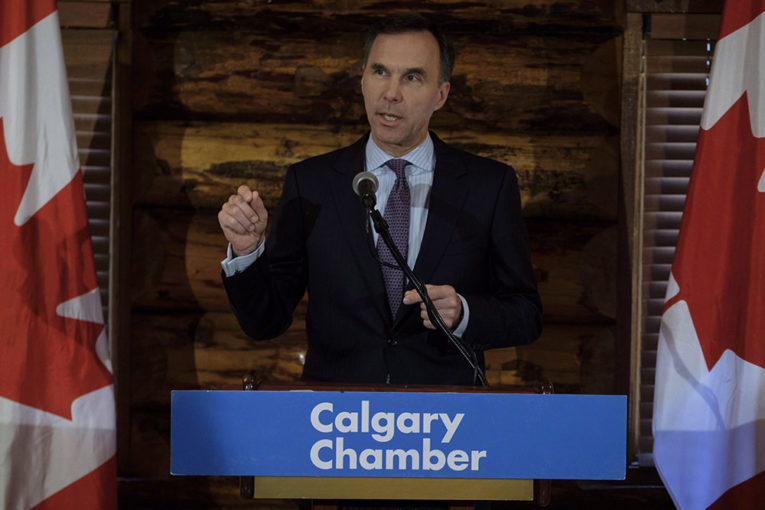
Federal Finance Minister Bill Morneau says Ottawa is here for a good time, not a long time, when it comes to ownership of the Trans Mountain pipeline.
But Premier Rachel Notley says that if Alberta ends up investing in the project, the province may be in no hurry to unload its ownership stake.
Speaking to a Calgary Chamber of Commerce luncheon a day after the Liberal government announced it would spend $4.5 billion to buy Kinder Morgan’s Canadian assets to ensure the expansion of the Trans Mountain pipeline takes place, Morneau insisted the government wants to return the project to the private sector as soon as possible.
“We are here for what we hope to be a relatively short time,” he told the crowd of about 550 people, which included Premier Rachel Notley, at the Big Four Building on the Stampede grounds.
Kinder Morgan had set a May 31 deadline for the political uncertainty around the pipeline to be resolved or it was prepared to walk away from the project. Morneau said buying Kinder Morgan Canada’s assets was not the preferred option initially, but ended up being the most suitable solution given current “exceptional” circumstances.
“We don’t see this as a symbol of the way to get things done in this country,” said Morneau, dismissing the idea the nationalization reflected a poor business and investment climate in Canada.
The Trans Mountain expansion has faced fierce opposition from environmental groups and some British Columbia First Nations and municipalities. B.C.’s NDP government has said it will use all tools at its disposal to try to stop the project, which has meant mainly a reference case to the province’s Supreme Court to determine whether the province has the jurisdiction to block increased bitumen shipments.
Protests interrupted Finance Minister Bill Morneau’s Calgary visit. Postmedia/James Wood
Morneau’s speech was briefly interrupted by environmental protesters who shouted “this pipeline will never be built,” before they were led out by security. The groups Climate Justice Edmonton and the Council of Canadians took responsibility for the disruption.
Earlier, a group of pipeline supporters gathered outside the building before Morneau’s speech, chanting slogans such as “build that pipe.”
For Alberta, the expansion of the Trans Mountain line to Vancouver is crucial to open new markets for the province’s oilsands crude and achieve better prices for the commodity.
The Kinder Morgan deal sees Alberta’s NDP government prepared to chip in up to $2 billion to cover costs that stem from “unforeseen circumstances,” with any provincial dollars translating into equity in the project once it is complete.
At an event with unionized workers celebrating the pipeline moving forward, Notley said that if the province ends up in an ownership position, it will decide at the appropriate time whether it makes more sense to sell or to hang on and reap potential dividends.
She suggested Alberta could potentially earn $2 billion back in a year-and-a-half from a bump in incremental revenue stemming from the pipeline being in operation.
“We are confident that when this project gets built, it will be a very healthy profit-making venture,” said Notley.
“The risk is low, the payoff is huge.”
While Morneau said Ottawa doesn’t want to be the proprietor of the pipeline, he said the government’s first priority is ensuring the Trans Mountain expansion is finished, whether the project is under the private sector or in public hands.
He told reporters after the speech that any deal to sell the Kinder Morgan assets must also be fair to Canadian taxpayers, though the end goal is construction, not necessarily profit.
But Morneau provided few details on his timeline for making a sale or whether the government had a preference on who ultimately buys the project. The Toronto MP reiterated that he has personally had conversations with pension funds and Indigenous groups about investing in the pipeline.
“The federal government is enabling the project to move forward, reducing the uncertainty caused by politics, and that is going to increase value (of the pipeline),” he said.
Related
While the Trans Mountain expansion has been pegged at $7.4 billion, Morneau also declined to speculate on the potential price tag for construction.
The lack of information frustrates the federal Conservatives, who say the Trudeau government caused the situation through regulatory uncertainty and the situation should never have come to nationalization.
Calgary Nose Hill MP Michelle Rempel, who attended Morneau’s speech, said it was “heavy on rhetoric, light on details.”
“No further details on the cost of construction, how the federal government is going to enforce jurisdiction over the B.C. government . . . no details on how they’re going to overcome B.C. court challenges, no details on enforcing the rule of law when it comes to protests,” she said.
But many in the Calgary business crowd welcomed the federal intervention as a necessary, if not ideal, step.
Imperial Oil CEO Rich Kruger said the pipeline deal illustrates that Ottawa recognizes the pressing need for greater market access for Canadian resources.
“New pipelines, expanded access, is and continues to be imperative,” he told reporters.
“From an industry perspective, from an Imperial Oil perspective, it’s a very good thing.”
You can read more of the news on source
